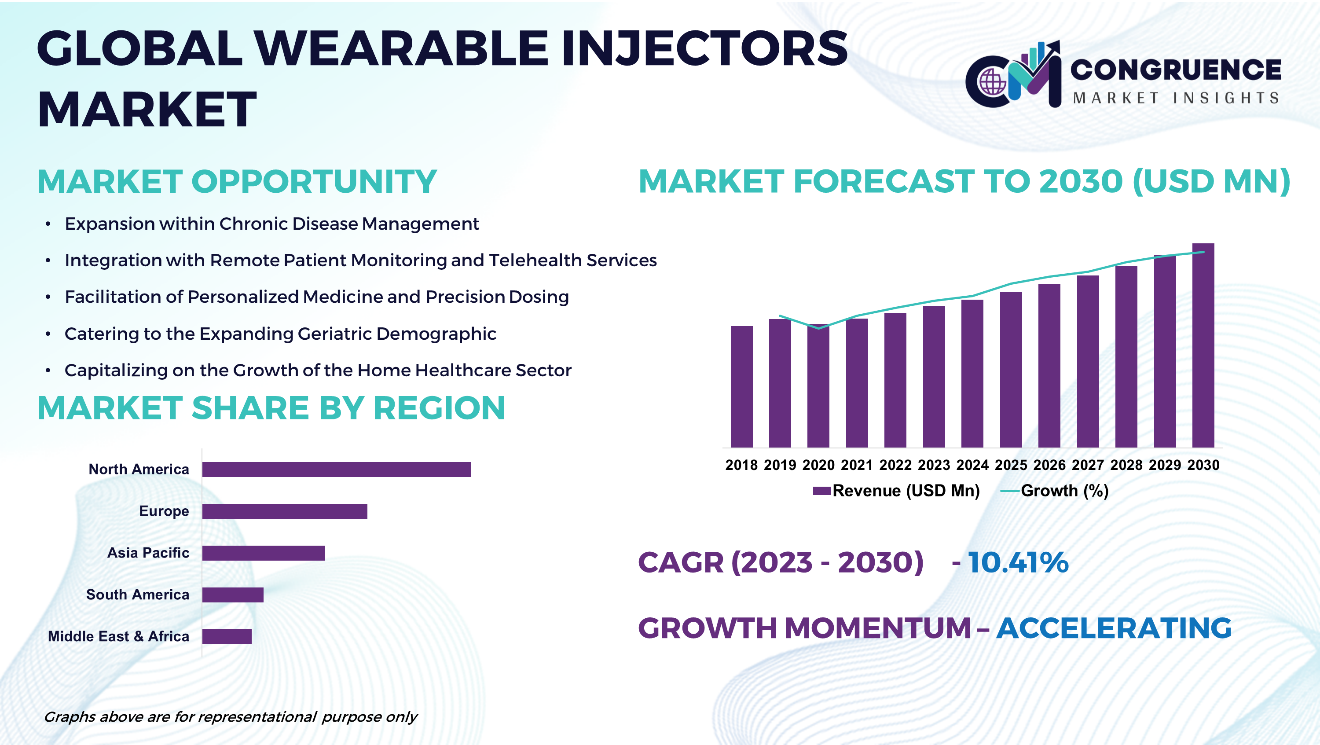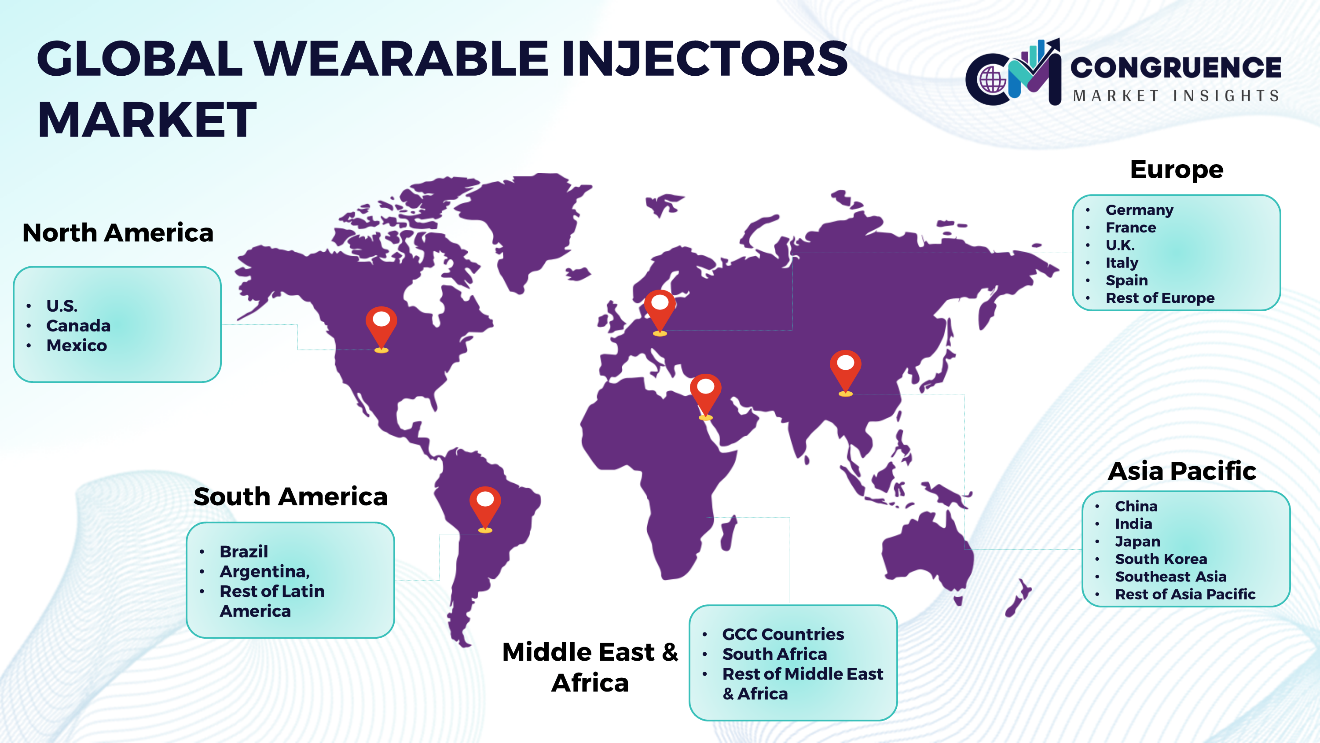Reports
The Global Wearable Injectors Market is expected to expand at a CAGR of 10.41% between 2023 and 2030. The wearable injectors market has seen remarkable expansion driven by rising chronic disease rates and the need for convenient drug administration. Initial market introduction focused on developing advanced wearable injector devices capable of delivering precise medication doses over extended periods, thus improving patient compliance and treatment efficacy. Integration with Industry 4.0 technologies has reshaped the market landscape, enabling remote monitoring, data analysis, and personalized treatment approaches. Technological advancements, including smart sensors, connectivity features, and user-friendly interfaces, have enhanced device usability and patient satisfaction. The market is experiencing increased collaboration, partnerships, and strategic alliances among key players to capitalize on emerging opportunities and expand market reach. With ongoing innovations and evolving regulatory environments, the wearable injectors market is positioned for continued growth, driven by demand for innovative drug delivery solutions and the adoption of digital health technologies.

Wearable Injectors Market Major Driving Forces
Escalating Burden of Chronic Diseases: The surge in chronic conditions like diabetes, cardiovascular ailments, and autoimmune disorders is fueling the demand for wearable injectors as convenient solutions for managing long-term therapy.
Preference for Self-Administration among Patients: Wearable injectors empower patients to self-administer medications, fostering independence, convenience, and adherence to treatment schedules, particularly for regimens requiring frequent dosing.
Advancements in Technology: Continuous innovations in wearable injector devices, encompassing advancements like miniaturization, connectivity features, and integration with smart sensors, are enhancing device usability, safety, and patient comfort, thereby propelling market growth.
Integration with Industry 4.0: The amalgamation with Industry 4.0 technologies such as the Internet of Things (IoT), artificial intelligence (AI), and data analytics enables remote monitoring, personalized dosing, and real-time feedback, thereby improving treatment outcomes and patient engagement.
Focus on Home Healthcare: With the increasing trend toward home-based healthcare and remote patient monitoring, wearable injectors provide cost-effective solutions for administering complex therapies outside conventional clinical settings, driving market expansion.
Wearable Injectors Market Key Opportunities
Expansion within Chronic Disease Management: With the escalating incidence of chronic ailments globally, there exists a substantial opportunity for wearable injector manufacturers to broaden their presence in therapeutic segments such as diabetes, cardiovascular diseases, autoimmune disorders, and oncology. Strategically targeting these areas holds promise for significant market growth and enhanced patient care.
Integration with Remote Patient Monitoring and Telehealth Services: The increasing uptake of remote patient monitoring and telehealth platforms presents an opportune moment to integrate wearable injectors into virtual care ecosystems. Through the incorporation of connectivity features, these devices can facilitate seamless data transmission, enabling remote monitoring of patient adherence, dosing precision, and treatment efficacy.
Facilitation of Personalized Medicine and Precision Dosing: Technological advancements in wearable injector solutions, including sophisticated sensor capabilities and data analytics, empower personalized medicine initiatives and precision dosing strategies. Tailoring drug delivery regimens to individual patient profiles, treatment responses, and disease trajectories stands to optimize therapeutic outcomes and elevate patient satisfaction levels.
Catering to the Expanding Geriatric Demographic: With the global aging population on the rise, there exists a burgeoning demand for patient-centric drug delivery modalities tailored to the unique needs of elderly individuals. Wearable injectors, characterized by their user-friendly design and ease of use, offer a compelling solution for older adults grappling with mobility constraints or challenges associated with conventional injection methods.
Capitalizing on the Growth of the Home Healthcare Sector: The burgeoning preference for at-home healthcare solutions and patient-driven medication administration underscores a lucrative opportunity for wearable injector manufacturers to penetrate the home healthcare market. Providing safe, intuitive devices conducive to self-administration at home holds potential to enhance patient autonomy, foster treatment adherence, and elevate overall care standards.
Wearable Injectors Market Key Trends
· Wearable injectors are increasingly designed to be smaller and more portable, enabling patients to seamlessly incorporate them into their daily routines, thereby enhancing patient comfort and adherence to treatment protocols.
· The integration of wearable injectors with digital health technologies, such as smartphone applications and remote monitoring systems, facilitates real-time monitoring of medication adherence and treatment outcomes. This connectivity enhances patient engagement and enables healthcare providers to remotely track patient progress.
· Customizable wearable injectors are gaining prominence, offering flexibility in medication volumes, injection rates, and user preferences. This trend enables personalized treatment plans tailored to individual patient needs and therapeutic requirements, thereby improving treatment efficacy.
· Smart sensors and data analytics capabilities embedded within wearable injectors enable the collection and analysis of patient data in real-time. This functionality provides valuable insights into patient behavior, medication adherence patterns, and treatment effectiveness, facilitating proactive intervention and personalized care strategies.
· Advances in drug formulations, such as high-viscosity formulations and long-acting injectable, are driving the development of wearable injectors capable of delivering these specialized medications. This trend expands the application of wearable injectors across a wider range of therapeutic areas and treatment modalities.
· Wearable injectors with user-centric designs, intuitive interfaces, and disposable components are gaining traction in the market. This emphasis on patient comfort, ease of use, and safety enhances the overall patient experience and fosters acceptance of wearable injector technology.

Market Competition Landscape
The market competition landscape in the wearable injectors sector is characterized by intense rivalry among key players striving for market share. Competition revolves around product innovation, technological advancements, pricing strategies, and market penetration efforts. Additionally, factors such as regulatory compliance, customer service, and strategic partnerships play significant roles in determining competitive positioning within the industry.
Key players in the global Wearable Injectors market implement various organic and inorganic strategies to strengthen and improve their market positioning. Prominent players in the market include:
· Bespak (Recipharm)
· Enable Injections
· Ypsomed AG
· Insulet Corporation
· West Pharmaceutical Services, Inc.
· CeQur Corporation
· Stevanato Group
· scPharmaceuticals, Inc.
· E3D Elcam Drug Delivery Devices
· SHL Medical AG
· Eitan Medical
· Sensirion AG
· Battelle Memorial Institute
· kaleo, Inc.
· Amgen Inc.
· Becton, Dickinson and Company (BD)
|
Report Attribute/Metric |
Details |
|
Base Year |
2022 |
|
Forecast Period |
2023 – 2030 |
|
Historical Data |
2018 to 2022 |
|
Forecast Unit |
Value (US$ Mn) |
|
Key Report Deliverable |
Revenue Forecast, Growth Trends, Market Dynamics, Segmental Overview, Regional and Country-wise Analysis, Competition Landscape |
|
Segments Covered |
· By Product Type (On-body Injectors:, and Off-body Injectors) · By Injection Type (Single-Chamber Injectable Devices, and Dual-Chamber Injectable Devices) · By Therapeutic Area (Autoimmune Diseases, Diabetes, Oncology, Cardiovascular Diseases, and, Neurological Disorders) · By End-User (Homecare Settings, Ambulatory Surgery Centers, and Hospitals and Clinics) |
|
Geographies Covered |
North America: U.S., Canada and Mexico Europe: Germany, France, U.K., Italy, Spain, and Rest of Europe Asia Pacific: China, India, Japan, South Korea, Southeast Asia, and Rest of Asia Pacific South America: Brazil, Argentina, and Rest of Latin America Middle East & Africa: GCC Countries, South Africa, and Rest of Middle East & Africa |
|
Key Players Analyzed |
Bespak (Recipharm), Enable Injections, Ypsomed AG, Insulet Corporation, West Pharmaceutical Services, Inc., CeQur Corporation, Stevanato Group, scPharmaceuticals, Inc., E3D Elcam Drug Delivery Devices, SHL Medical AG, Eitan Medical, Sensirion AG, Battelle Memorial Institute, kaleo, Inc., Amgen Inc., Becton, Dickinson and Company (BD) |
|
Customization & Pricing |
Available on Request (10% Customization is Free) |
